| THE
THINGS WE EAT |
| Tamaya
- known as felafel in other parts of the middle east, this is a ball of
bulgur, beans, and seasonings mashed together, fried, and sold on pita
bread for 50 piastres (about 10 cents). |
Ful
- fava beans (the national food of Egypt) mashed and seasoned, often eaten
for breakfast, and sold in sandwich form on the street for 50 piastres
(about 10 cents). |
| Kafta
- a common Middle Eastern food, consisting of seasoned ground meat,
wrapped around a skewer and grilled. |
Aysh
Baladi
- literally meaning "government bread," this is the pita bread
that is served with almost every meal and sold everywhere for only 5
piasters (about 1 penny) per pita. |
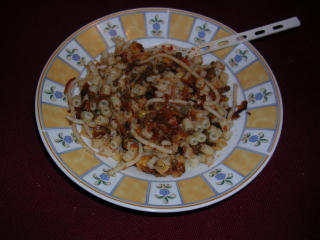 |
Kushari
- a cheap Egyptian food consisting of spaghetti, macaroni, rice, lentils,
corn, fried onions, and a spicy tomato sauce -
enough carbs to make Dr. Atkins cry! |
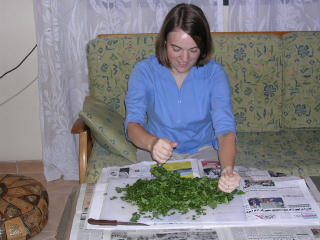 |
Molokheya
- a green soup made of finely chopped leaves that has a very slimy texture
(something not all foreigners appreciate) and is often served over rice or
with bread. I like molokheya, which is good because it is served
most Mondays when I work at the seminary! |
| PLACES
IN CAIRO |
| Khan
el Khalili - an area in old (medieval)
Cairo where vendors sell clothes, souvenirs, jewelry, spices, and just
about anything you can imagine, mainly to tourists. |
 |
| Souk
- the market where people go to buy and sell fruit, vegetables, animals,
and various other food products. |
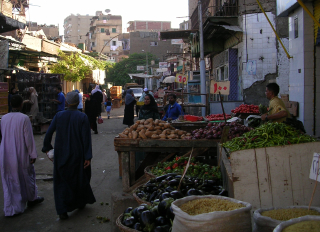 |
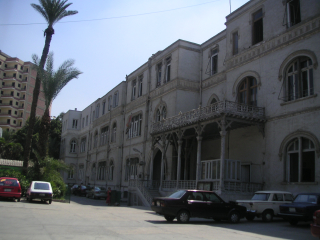 |
Ramses
College for Girls - the school where I work and live, located in
Ghamra, at the edge of Abbasiya. |
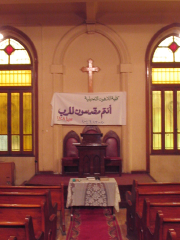 |
Evangelical
Theological Seminary of Cairo - the seminary, closely associated
with the Presbyterian church (USA), where I work in the fundraising
office. |
| MISCELLANEOUS
STUFF |
| Galibaya
- an article of clothing, similar to a
choir robe, worn by men, women, and children in Egypt, particularly in
rural areas. |
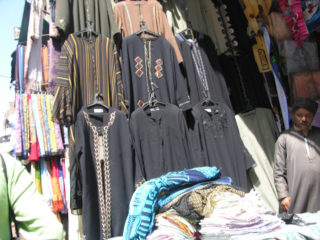 |
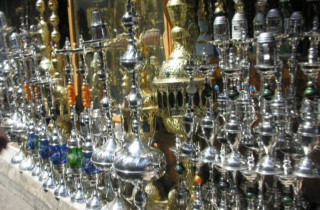 |
Sheesha
- a popular leisure activity in Cairo that takes place at bars and cafes,
where people (usually only men) go to smoke tobacco. |
| Traffic
- you may think you already know this
word, but until you've visited Cairo, you won't be able to imagine the way
people drive here; the rules are: never stop for any reason
(pedestrians included) and honk constantly. |
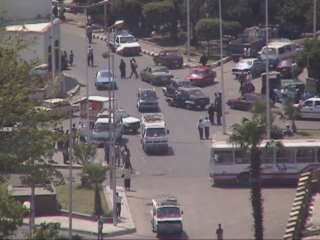 |
| Sabeel
- a public drinking fountain, usually consisting of clay water jugs in a
rack or metal mug chained to a large metal water cooler, available to all
people, although I would never consider actually drinking from one in
Cairo! |
Women's
Car - the first 1 or 2 cars of the metro that are reserved
exclusively for women (el hamdullah); this makes riding a packed metro
much more tolerable for those of us who don't enjoy close contact with
Egyptian men. |
| USEFUL
ARABIC PHRASES |
el
hamdullah - "thanks to God"
This phrase is used all the time in just about any situation and is even
used to answer the question, "how are you?". |
shoukran
- "thank you"
In addition to being used to thank people, when spoken to a persistent
vendor, this also means "no thank you, go away". |
insha'allah
- "God willing"
Everything in this culture is "insha'allah." |
la
- "no"
Useful for persistent vendors and second primary students alike |
| kidda
- elusive Arabic phrase that may or may
not mean any of the following: 'good job," "turn
left," "turn right," "this," "that,"
"it," "okay," or really anything you want it to
mean. |
yanni
- a filler word that literally means,
"it means," but used as a filler word the way people in the US
use "like," "um," "you know," etc. |
| malish
- this can mean "I'm sorry,"
but can also mean, "It's no big deal," "Don't worry about
it," or "Too bad." |
mumkin
- "possible" or "maybe"
I had to teach Josh this one because it creeps into my English so often! |
| aywa
- "yes" |
bi
kem - "how much"
An important question to ask in a culture where nothing ever has a set
price |
